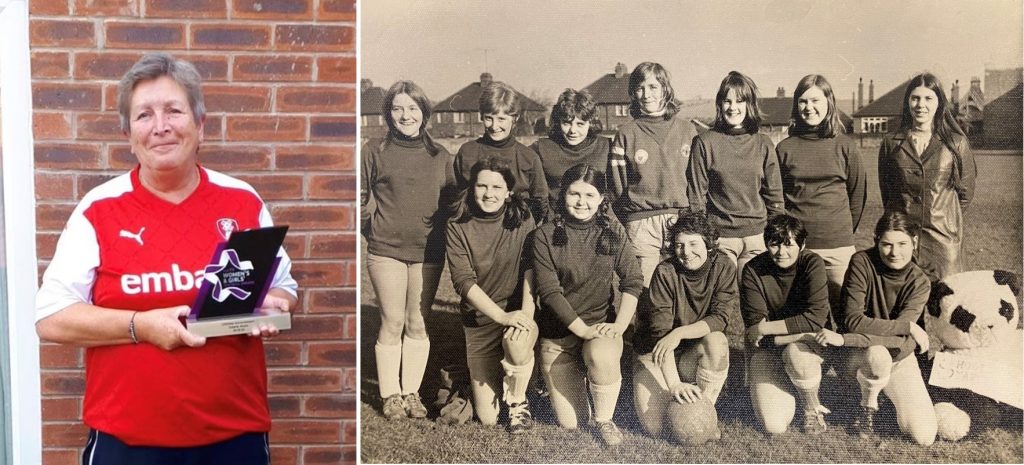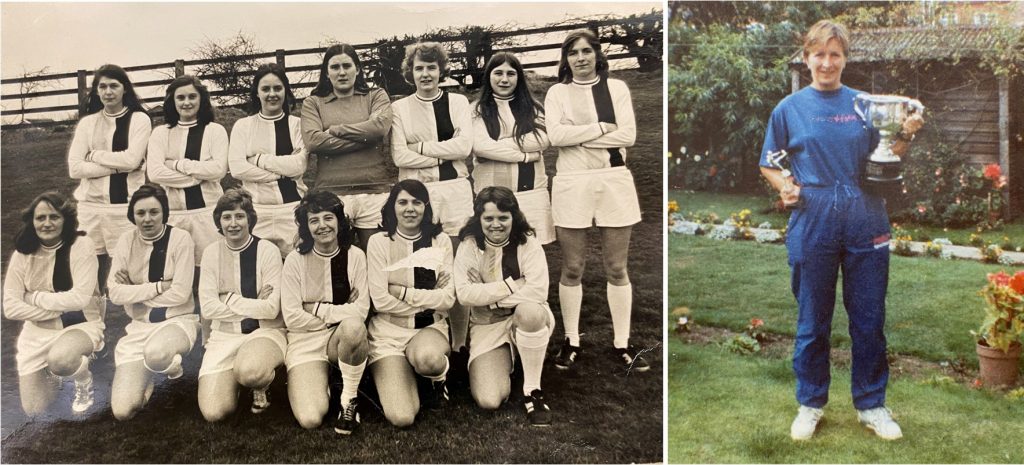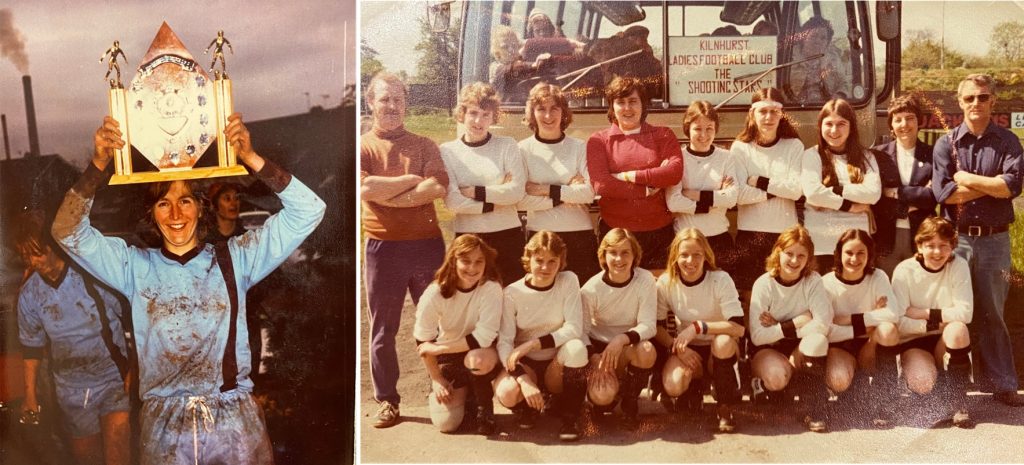Trundled in the back of her dad’s green transit van, a 12-year-old schoolgirl captained a bunch of her friends from Swinton to a game of five-a-side football at Rawmarsh baths.
While that might sound commonplace by today’s standards of parents ferrying their kids around to after-school sports clubs, this was in the late 1960s when women and girls were actively prevented from playing football.
That remarkable 12-year-old girl was a young Val Hoyle who’d courageously created a girls’ football team out of lack of opportunities at school. The same fledgling five-a-side team would go on to shape the women’s game in Rotherham, opening up a whole new world of sporting prospects for generations to come.

Almost 53 years later, prime playmaker Val is still involved in what has since become Rotherham United Women Football Club. In those five decades she’s been the founder, player, coach, chair and now club secretary, inspiring a whole host of her sporting contemporaries along the way. For her dedication, Val, now 65, recently won the prestigious Women’s FA Lifetime Achievement Award after being nominated by a current Rotherham United Women player.
We were privileged to catch a word with Rotherham United’s key ambassador for women’s football to hear more about how she’s never let anything hold her back.
Born in Colchester, Essex in 1957, Val is the youngest of three children; her parents, Reginald and Joyce, met when Joyce was relocated down south from Rotherham to work as a land army girl during WWII.
The family moved to Rotherham when Val was two, residing in Rawmarsh before relocating to Swinton when Val was 11. It is here where her love of sport was borne and nurtured.
“The only other kids on my street were boys, so all my friends were lads. If you didn’t like sport or weren’t sporty enough to join in then you’d have nobody to play with. I played for the school in all sports: hockey, rounders, netball, athletics. Anything to do with sports, that was my bag. But it wasn’t accepted then for girls to play football at school,” Val says.
At the time, the FA had a blanket ban on women and girls playing football on association pitches, having deemed it ‘unsuitable for females’ when the ban was set in 1921. As a result, women and girls had been pushed into the shadows for almost half a century before the ban was lifted in 1971.
Never one to be deterred, Val and a friend who was also interested in football approached a couple of boys in their year group to swap their football lesson for the girls’ cooking class.
Soon after, encouraged by her parents, Val established the five-a-side girls’ team which coupled up as a youth club, made up of pre-teen girls from the Kilnhurst area. Reginald would transport the team around in his van to wherever they were playing, which was usually Rawmarsh baths on Haugh Road, the pool covered up with boards so they could play.
Val started off as a goal keeper to fill the role nobody else wanted, then moved to left wing, left midfield, before finishing up in her favourite position, centre half.
As the girls grew into young women, Val and her older sister Annetta formed an 11-a-side women’s team when she was 17 called Kilnhurst Shooting Stars. Consisting of mostly young married women with a connection to the youth team, they played in a Sheffield league against only a handful of women’s teams.
“Women footballers still weren’t accepted back then and it was difficult to break down those barriers. But we set the foundations for where women in football are at today. I never envisioned we’d still be around all these years later.”
Home games were initially on council-owned pitches in Kilnhurst and the team designed their own badge to reflect the shooting stars name. Over the years the team has been known under various guises, including Kilnhurst Ladies, Milmoor Ladies and Parkgate Ladies. They have been affiliated with Rotherham United for almost twenty years and now call Roundwood Sports Complex in Rawmarsh their home.

At one stage, the club was one of the better women’s teams in Yorkshire for the trophies they’d won. Throughout the ‘00s, the club yo-yoed in and out of the third tier of the women’s football pyramid. Going into the 2022/23 season, the first team plays in the premier division of the East Midlands Regional Women’s Football League.
Val’s affinity with the club she established runs deep, with some saying her loyalty hampered her chances of taking her talent further. As a left-footed player, quite rare in women’s football, Val was a supremely talented player and unstoppable in her prime. Had she been afforded the opportunity, she could have played for England.
“Rotherham is a small team and we never played in an elite league so I was never spotted. And I couldn’t ever leave a team I spent so much time at. In the early days we played in the same league as Doncaster Belles, but they went on to be more successful. Over the years we’ve lost a lot of players to bigger clubs who play at higher levels but some past players have also gone on to play in America and Finland.”
Women’s football today is a far cry from Val’s day, where professional contracts weren’t available and women had to balance several jobs, and sometimes a family, while driving around the country chasing a dream that didn’t pay the bills. This new generation of female players experience a completely different world, with a focus on football education, academy support, and talent development from an early age.
“Most sports have moved on since the 1960s but with football, the opportunities for girls are vast. They can start playing for a school team at eight or nine, and if they’re good enough there should be no barriers to progression as there are sports colleges and high performance centres.”

Val hung up her boots aged 41 after thirty years but her devotion to the beautiful game is clear to see. She then went into coaching and management and is now the secretary of Rotherham United Women which she juggles alongside her full-time role as a care home inspector with the CQC, having been in the care sector since she was 18. Game days are still as busy as when she was on the team sheet. Her Sundays are spent doing virtually every job, from standing on the gate to arranging matches and sending match reports and paperwork to the league.
She’s also in charge of registering players each season, with the current first team and newly-formed reserve team amassing over 50 women aged between 16 and 35, who all pay towards each game which costs around £265. They’re supported by Rotherham United Community Sports Trust who help with kit and sponsorship, but other than that they receive no funding.
“Funding in women’s football is one of the biggest issues we face. It costs us about £15,000 a season to play which takes some finding. Working women are not of the age to do bag packing in supermarkets so we must find different ways of fundraising. We’re always looking for volunteers to help on match days or fundraise for us.”
With the world’s eyes on women’s football this summer as the UEFA Women’s EURO highlights the accelerated growth of the sport, and Rotherham playing its role as one of nine host venues, Val is hopeful for the future of women’s football.
“I hope the Women’s EURO does well as it’s important for the profile of women’s football. There’s still a big gulf between grassroots clubs and elite teams in the Women’s Super League, your clubs like Chelsea, Arsenal, Liverpool. But the women’s game is growing enormously and the only way to encourage kids similar aged to what I was when I started to get involved is by raising the profile.”






